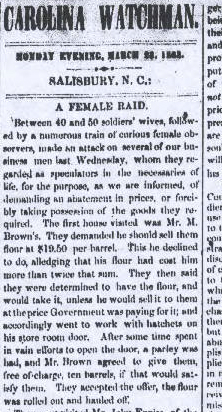
On March 18, 1863, a group of about fifty women, all wives, and mothers of Confederate soldiers participated in what would become known as the Salisbury Bread Riot. The women blamed speculators for driving up the prices of necessary items during the Union blockade. Struggling to provide for their families, they banded together against the businesses that they suspected of speculating and demanded government prices for goods.
Michael Brown, the owner of a local store, recalled that when he refused to deal with them, the women attempted to break down his storeroom door with hatchets. Finally, he decided to give them ten barrels of flour if they would leave. By the end of the day, the women had obtained “twenty three barrels of flour, two sacks of salt, about half a barrel of molasses and twenty dollars in money.”
The group later wrote to Governor Zebulon Vance to explain their unpleasant, but justified actions. The Carolina Watchman, a local newspaper, commented on the event but did not place blame on the women. The editors instead blamed the ineffectiveness of the government to provide enough food for the families at home. This event ultimately led to better rationing of government resources to aid Civil War soldiers’ families.
Other related resources:
- A newspaper account of the riot from 186, available online in the digital collections of the State Archives and State Library
- The Civil War on NCpedia
- North Carolina and the Civil War from the N.C. Museum of History
Image from digital collections of the State Archives and State Library.
